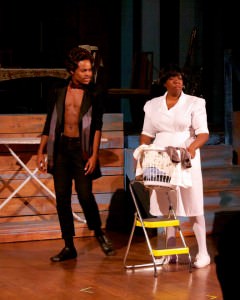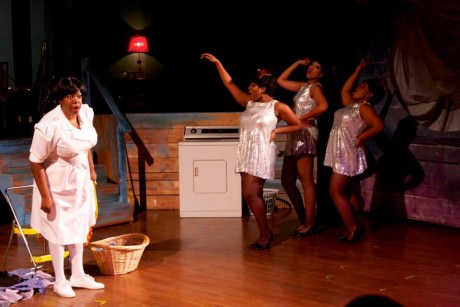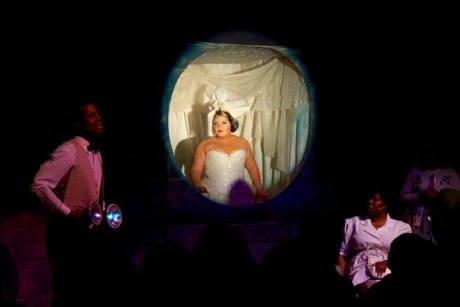For a change, catch this show before it gets away
DO run to catch Caroline, or Change at Stillpointe Theatre Initiative. It’s a must-see show, it is worth several times the ticket price.

When most folks are busy warming themselves with E-Z traditional holiday-season shows like A Christmas Carol or The Nutcracker, it may take some effort to see a production that requires a sense of history, and a willingness move out of one’s comfort zone to view our turbulent past through a different set of eyes.
The notion that what happens in this amazing piece of musical theater runs parallel to what is in the headlines today – economic woes, poverty, homelessness, racial profiling, police brutality, wars, protests and rioting – deepens the sense that as much as we’ve advanced, we seem to be stuck in time.
Caroline, or Change refers, on the surface, to choices a child must make. Ultimately, it has a far deeper meaning. The show, is a musical, of sorts. Perhaps a modern, urban American opera would be a better description.
On Sunday evening, there were more people in the cast than in the audience. A crying shame as this show is a polished gem.
The book and lyrics for Caroline, or Change were written by Tony Kushner, author of the much heralded Angels in America. In workshops for 11 years, Caroline, or Change debuted in 2004 and won several awards.
It is infused with Kushner’s memories of his childhood. As a youngster, he moved from New York City to Lake Charles, Louisiana – quite a cultural shock. His father was a professional musician, playing the clarinet. His mother performed on the bassoon. They were observant Jews.
The show’s music is by Jeanine Tesori (Shrek and Violet) and it is directed dynamically by Darnell Morris. The show, a production of Stillpointe Theatre Initiative is staged in the 160-year old, Gothic-style Emmanuel Episcopal Church in Baltimore.
The four-member band, conducted by Stacey Antoine, performed beautifully. Perhaps, too well. My only complaint is it often played too loudly for the audience to clearly hear the characters’ voices. The actors all wore body mics to amplify their singing and dialog, but the words got drowned out at key points. I was in the third row, unable to hear performers less than ten feet away. Take it down a few notches on the percussion and bass, guys, and this show will be just about perfect. (A side note: this hugely talented band kept jamming long after the show ended and the audience and cast members had departed.)
Upon entering the church vestibule, a ticket holder can’t help but notice the soaring beauty of the old limestone sanctuary. Get there early and take a peek inside.
The show is in the church’s Great Hall, up an ancient wooden staircase.
This hall is bigger than most contemporary churches. It, too, has a high, vaulted ceiling, though its arches are rough hewn wood. The stone walls are sheathed in high oak paneling; the rear of the stage is pierced by leaded glass lancet windows.
The creative set and prop design, by Ryan Haase, and his team (Nolan Cartwright, Jeanine Vreat, Danielle Robinette, and Mitchel Brower), is on three levels. All in all, an awesome set. The major portion of the musical takes place directly in front of the audience. The ground floor of a home occupies the next level, set about 30 feet back from the first row, and a chair, side table and lamp perch high on the third level, atop a set of wooden stairs. The band is partially concealed behind the stairs at the rear of the house.
As the audience enters the room, two moveable set pieces block the view of the rest of the stage. They appear to be made of weather worn, loosely nailed horizontal barnwood planks. They turn out to be hand-painted strips of screen. One is a shadow box. It has a large hole cut out of it and is dressed with white drapery.
It is the home of The Moon (a dynamic Morgan Fannon who possesses a terrific set of pipes). Once the two pieces are pulled away, the stage is revealed.

The show begins on November 22, 1963. Another date of infamy.
Wearing the ill-fitting, starched white uniform of a maid, Caroline Thibodeaux is in the basement doing the laundry. A basement in Lake Charles is a rarity. For Caroline, performed stunningly by Theresa Cunningham, it is a prison. She feels much of her work life is spent below water.
An African-American, Caroline goes by many names: maid, domestic, the help, a Negro, a colored person, mom. Divorced from an abusive Navy veteran and raising three children by herself, she earns $30 a week. Her kids want a TV set, a car, new clothes, Christmas presents, but Caroline is already behind on her rent. She is bitter, resentful and angry.
She’s been a maid for more than two decades and she sees no way out. In this basement, the Washing Machine, the Radio and the Dryer are portrayed by actor-singers. So, too, is the often-late Bus that brings her to and from work.
The Washing Machine is a sensual, bustier-clad venus (Kay-Megan Washington) that rises from behind a onstage machine to encourage Caroline throughout her long workdays. The Dryer, which Caroline later explains was made is hell, is a negative scamp, played by a handsome devil, Lawrence D. Bryant. He uses his machine as a throne from which to taunt Caroline.
The Radio, a cross between the Andrews Sisters and the Supremes, is a 20th century Greek chorus. Radio is performed in short, all-over sequinned tank dresses by Nia Simone Smith, CiCi Monae, and Sontoya Tiana.
Special notice, here, to the costume and hair team of Danielle Robinette, Mitchel Brower, and Ryan Haase. Most of the women in the cast wore period wigs, some understated. The Radio had short curly ‘dos, while the Moon, Washing Machine, and, yes, the guy Dryer had elaborate up-dos. Moon and Washing Machine also sported sparkly makeup ramped up by the lighting design of Amanda J. Rife.
The singing is non-stop – Caroline, the various appliances, the Bus and the rest of the cast all have beautiful, passionate voices. Cunningham’s soliloquy “Lot’s Wife’ is a force of nature. Astounding!
Caroline is employed by the Gellmans, a Jewish family. Stuart Gellman (Ben Shaver), a professional clarinetist, is still mourning the death by lung cancer of his late, chain-smoking wife, a bassoonist. He recently married a New Yorker, Rose Stopnick Gellman (Shani Hadjian). Rose is getting used to married life, having step-motherhood suddenly thrust upon her, and having to deal with a moody, angry maid in the basement.
Noah Gellman, an 8-year-old, misses his mother and is shocked by the quick rebound marriage of his father. He is portrayed by Steven Gross, who appears to be about 12-years old. Yet, he accurately captures the neurotic angst of this 3rd grader.
Noah idolizes Caroline and likes to watch her as she works. “Caroline our maid,” he sings. “Caroline! Caroline! Caroline! The President of the United States! Caroline who’s always mad. Caroline who runs everything. Caroline who’s stronger than my dad.”
Caroline allows the boy to light her daily cigarette. Though tobacco killed his mother, he has a cigarette, too.
Noah also has a bad habit of leaving change in his pants pockets.
His stepmother, who is gingerly stepping around a still-dazed husband, a feisty 8-year old and a sullen maid, decides to teach Noah a life lesson. Plus, the family doesn’t have enough income to give Caroline a raise. “Loose change. Quarters. Those add up. The Negro maid, she’s making bupkes. How does that look, leaving change in his pockets?” she sings in an expensive, long distance call to her father Mr. Stopnick (B. Thomas Rinaldi) in New York.
Any change the maid finds in Noah’s pockets while doing the laundry, Rose decides, Caroline can keep instead of putting it in a cup. Caroline resists at first, but then considers all the things her own kids can buy at the local Five and Dime.
At the bus stop that evening, the outside world collides with her private demons. Caroline learns of the death of President Kennedy from a friend, Dotty Moffett (S. Ann Johnson), who is taking college courses.
Over the next few weeks, Caroline’s kids Emmie Thibodeaux (Nasya Nicole Jeffers – an amazing young singer, especially in her solo “I Hate This Bus”), Jackie Thibodeaux (an earnest Myles Muse), and Joe Thibodeaux (the scene-stealing A.J. Garrett. It’s hard not to watch this empathetic youngster when he’s onstage), rejoice when given a quarter or other loose change from Noah’s pockets.
Though the “change” in the play’s name could represent the detrius of Noah’s pockets, it also suggests the ongoing revolution for civil rights. Emmie and Dotty see the change. Dotty is preparing for the future by earning a degree; Emmie has a small, secret part in inciting a local revolt.
Caroline is devastated by JFK’s death, she believed the President when he said his proposed Civil Rights Legislation would bring a change in the lives of American blacks. But, Emmie is unfazed: “Say he do stuff for us. Get our vote. He just ignore us … I ain’t got no tears to shed for no dead white guy.”
Rose’s father comes to visit in December to help celebrate Hanukkah with the Gellmans and the Gellman Grandparents (Dyana Neal and Jim Knost). Emmie and Dotty are asked to join Caroline in preparing the Chanukah feast.
Mr. Stopnick gives Noah a Hanukkah present a bit more extravagant than gelt – a $20 bill. He also gets into a heated argument with Emmie over the ongoing Civil Rights movement. He says Dr. Martin Luther King, Jr.’s practice of nonviolent protests is too passive. Emmie counters that he knows little “sitting safe and pretty way up North in New York City!”

The characters are separated and Emmie and Caroline have another explosive argument in the Gellmans’ kitchen.
The next day, Noah suddenly remembers he left his $20 gift in in pants pocket.
He has to make a choice.
So does Caroline.
And, now, so do you.
Running Time: Approximately 2 1/2 hours, with one intermission.
Caroline, or Change plays through January 3, 2015 at Stillpointe Theatre Initiative performing at at Emmanuel Episcopal Church – 811 Cathedral Street , in Baltimore, MD. For tickets, purchase them online, or at the door.





thank you for this wonderful write up. The play IS awesome and I’m not just saying that because Emmie is my daughter ;-)
Darnell Patrick Morris is an amazing director/choreographer. For a guy in his 20s he has a feel for theatre beyond his years. What’s more, his cast members LOVE him. He is the sweetest and kindness of men. He brings out the best in the performers and they put forth their best to please him. It doesn’t get any better than that. Keep your eye on this guy.
Go Darnell.